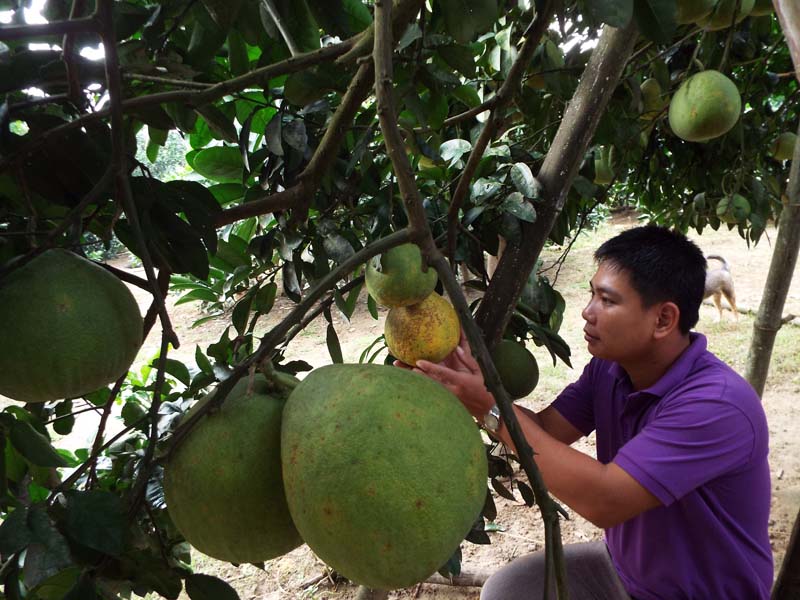
(HBO) - Up to now, Tan Lac district has 1,046.8 hectares, increasing 187.5%, exceeding 488.4 hectares in comparison with 2015. Of which, 55 hectares are newly planted, the planted area of from 1 to 3 years is 596.8 hectares, the area for harvesting is 395 hectares.

Farmers in Dong Tien village, Dong Lai
commune (Tan Lac) checked the quality of grapefruit.
The chairman of Thanh Hoi Commune People's
Committee Mr. Bui Van Phon said: The area of grapefruits in the whole commune
is about 300 hectares, almost all in 19 hamlets, of which the area of harvest
is about one third. Grapefruit is a key plant, contributing to the income
improvement, poverty reduction and wealth enrichment. The grapefruit growers
have basically had their food.
At the end of 2017, the district received the
Collective Brand of "Tan Lac Red Grapefruit" .The district has set up
cooperatives, cooperative groups ò producing, processing and consuming red
grapefruits, cooperating with farmers to produce grapefruits safely under VietGap
standards, ensuring food safety and hygiene to provide the market with high
quality products. Because of the favorable conditions of soil and climate,
grapefruits are still plants of high value of Tan Lac. The income from
grapefruits reaches hundreds of millions VND / hectare, which is many times
higher than sugarcane plantation.
Tan Lac district is also implementing
measures to improve the effectiveness of the implementation of Resolution No.
10-NQ / HU in connection with the restructuring of the agriculture sector in
the direction of enhancing the value and sustainable development associated
with New Rural Area development. . It aims to maintain the area of grapefruit
plantation of about 1,300 hectares and develop grapefruit in the concentrated
planning in areas and locations with favorable conditions for soil and climate;
avoiding the maximum exploitation of the area for grapefruit plantation, which
can cause to the imbalance of grapefruit products. In addition, they also
encourage and orientate the local people to renovate the mixed garden, apply
the technology and science for planting grapefruit in accordance with safety
standards (VietGap, Globlap), producing grapefruits in the linking chain; well
managing the quality of Tan Lac red grapefruit products, strengthening
propaganda, promotion, brand building, geographical indications of Tan Lac red
grapefruits.
According to data from the Hoa Binh Provincial Party Committee, the industrial production index for the first six months of 2025 is estimated to have increased by 20% compared to the same period last year. This marks the highest year-on-year growth rate for this period since 2020.
In the first six months of 2025, Hoa Binh province’s export turnover was estimated at 1.145 billion USD, marking an 18.11% increase compared to the same period in 2024. Import turnover was estimated at $ 804 million, a 17.15% increase, which helped the province maintain a positive trade balance.
The lives of the ethnic minority farmers in Tan Lac district have gradually improved thanks to the new directions in agricultural production. This is a testament to the collective strength fostered through the professional associations and groups implemented by various levels of the district’s Farmers’ Union.
With the motto the "product quality comes first,” after nearly one year of establishment and operation, Muong village’s Clean Food Agricultural and Commercial Cooperative, located in Cau Hamlet, Hung Son Commune (Kim Boi district), has launched reputable, high-quality agricultural products to the market that are well-received by consumers. The products such as Muong village’s pork sausage, salt-cured chicken, and salt-cured pork hocks have gradually carved out a place in the market and they are on the path to obtaining the OCOP certification.
In the past, the phrase "bumper harvest, rock-bottom prices" was a familiar refrain for Vietnamese farmers engaged in fragmented, small-scale agriculture. But today, a new spirit is emerging across rural areas of Hoa Binh province - one of collaboration, organisation, and collective economic models that provide a stable foundation for production.
Maintaining growing area codes and packing facility codes in accordance with regulations is a mandatory requirement for agricultural products to be eligible for export. Recently, the Department of Agriculture and Environment of Hoa Binh province has intensified technical supervision of designated farming areas and packing facilities to safeguard the "green passport" that enables its products to access international markets.



